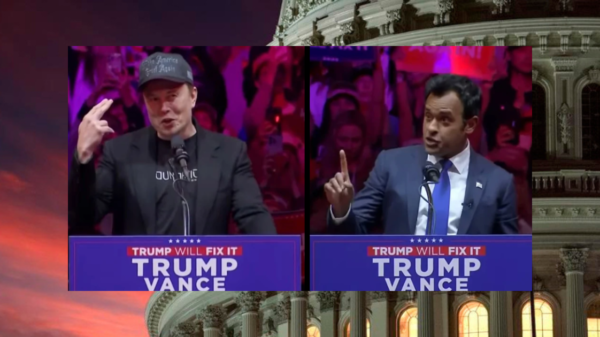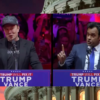Vivek Ramaswamy wants to do something normal politicians work to avoid. A successful biotech entrepreneur turned “anti-woke” reformer, the Republican author and activist is running for president while actively trying to break the fourth wall of American campaign politics.
Candidates don’t generally talk trash about the cadre of operatives and politicos who manipulate the political landscape behind the scenes. But Ramaswamy says his campaign received a call the day after he announced, and the consultant on the other end of the phone offered a prize that would intrigue any upstart presidential candidate: second place in the CPAC straw poll.
“I was shocked,” Ramaswamy first said during a Fox Business appearance, before he and his campaign laid out more of the details in an interview with RealClearPolitics.
The unnamed consultant allegedly called the day after Ramaswamy announced his campaign in a Wall Street Journal op-ed. “If you basically pay more, upwards of $120,000, we can give you more tickets so you can bus more people in,” a senior campaign official said they were told, “and you’ll be higher on the straw poll.” A respectable but solid showing in that poll would cost $80,000. “Second place,” the aide said was priced at, “closer to $200,000.”
The Ramaswamy campaign declined to go on the record with the name of the consultant for fear of retribution. They did, however, share the identity of the individual with RCP who confirmed that the consultant who allegedly made the offer serves in a leadership capacity within CPAC. Politico first reported that the consultant in question has ties to the conference. Ramaswamy’s reaction when approached with the offer? His campaign said he replied, “Hell no.”
The Conservative Political Action Conference flatly denied the allegation. “Washington D.C. is riddled with unscrupulous consultants who make false claims,” a CPAC spokesman said, “including this one.”
The denial has not abated the controversy. One Republican operative accused CPAC Chairman Matt Schlapp “of shaking down new candidates.” Representatives of two other 2024 hopefuls told RCP they were not approached about buying up extra tickets to boost their chances in the straw poll.
Former President Donald Trump won that survey with 62 percent of the vote. Florida Gov. Ron DeSantis did not attend the conference but came in second with 20 percent. Perry Johnson, a businessman who ran for governor in Michigan but was later disqualified because of thousands of fraudulent nominating signatures, placed third ahead of former Southern Carolina governor and former U.N. ambassador Nikki Haley.
Ramaswamy finished fifth with only 1 percent of the vote. He says isn’t bothered by that result, but that the experience did cement a “philosophy of taking everything and just open-sourcing it.” In the weeks and months ahead, the candidate said his campaign will begin “democratizing” operations, bringing what’s normally done in the dark out into the light.
“The entire process of even getting elected has its own managerial bureaucracy, even a form of quasi-corruption,” Ramaswamy said. And while he doesn’t think “politics should be an industry,” he believes “it is one,” creating a fabricated exercise that benefits a professional class but poorly serves voters. At very least, the candidate continued, if politics is an industry, “it better not be a cartel where only a few people, who are closest to it and who know how to play the game, get to play it.”
The Ramaswamy pitch to the American people is that political change isn’t enough. A cultural movement, something on the order of magnitude of a revival, is needed keep alive the American dream. He ends up talking a lot about the ins-and-outs of federal bureaucracy and administrative law.
Those aren’t the most natural topics for politicians, although Ramaswamy is comfortable taking them on. A biology major at Harvard and graduate of Yale Law School, he has been dubbed in the press as the “intellectual godfather of the anti-woke movement.” He talks frequently with Tucker Carlson. He has amassed a large online following with his crusade against unelected bureaucrats and the need to roll back the administrative state.
“We must revive merit in who gets to govern in America,” he wrote in the Wall Street Journal. “Democracy depends on a simple principle: The people we elect to run the government must be the people who actually run the government.” In a Ramaswamy administration, that means, among other things, scrapping the Department of Education and remaking the FBI .
“Do we just accept that permanently as the status quo here-on-after,” he said of what he sees as the corruption of those agencies, “or can we actually revive, dare I say, some idealism that institutions can go back to each serving their narrow, unique purposes with integrity?”
His campaign will “democratize” the way campaign bundling is done, he promised, so that “a special class” of professional political fundraisers don’t rake in a king’s ransom while working to elect a president. He won’t huddle with experts in private, either. He envisions briefings on issues done out in the open. “We’re going to release them as podcasts,” he said, “maybe even live stream them, just so people can actually understand that a U.S. president isn’t some sort of artificial, hollowed out of husk of a real human being, or someone who’s born with omniscient knowledge.”
“I’m not embarrassed about not knowing everything you need to do the job,” Ramaswamy added. “I think the secret is that nobody else knows all the aspects of doing this job either, so we are going to open-source it.”
This would be a risk. It also might be an appealing innovation to a more online generation of conservative voters who see the likes of Lex Fridman and Joe Rogan as their sources of news. The CPAC straw poll, specifically the alleged pay-to-play offer, could be an impetus.
A CPAC spokesperson defended their traditional way of gauging the appetites of voters. “Anybody with a rudimentary understanding of politics knows how a straw poll works: It takes organization and/or popularity for a candidate to do well,” they said. “One thing is enduringly true about presidential politics: It takes both to get to the Oval Office.”
This isn’t the first time the straw poll has been called into question. When Mitt Romney won in 2012, Rick Santorum accused the former Massachusetts governor of rigging the result by buying up tickets and busing in supporters. Suspicion has not abated in the years since.
Inside baseball doesn’t win elections, even though internecine fights remain a feature of the right. But talking about an imbedded and unaccountable managerial class in government, what Trump called “the deep state,” has captured the conservative imagination. He tells voters that if presidents aren’t allowed to serve longer than eight years, neither should government bureaucrats. That kind of message, Ramaswamy said, “is hovering right over the flame.” The average primary voter, he said, “is really well attuned to original sins.”
This also isn’t the first time a Republican newbie has waged a war on entrenched D.C. Beltway interests. Donald Trump campaigned against what he called “the swamp” – and still is. Ramaswamy gives him credit for that fight. “But I think he was constrained in his ability to execute for a wide variety of reasons,” he said. The next GOP generation, he said, needs “to build on that foundation to actually execute.”
Ramaswamy wants to abolish some government agencies, rebuild others, and significantly curtail the power of professional bureaucrats. But waging and winning a war against the swamp, he said, would require “a unique confluence of somebody who was educated in constitutional law combined with somebody who has actually built and run enterprises before and who understands that if somebody works for you, but you can’t fire them, they don’t actually work for you.”
He wants to pull back the curtain on how the government actually works. For now, that open-source limited approach will be limited to his campaign.
This article was originally published by RealClearPolitics and made available via RealClearWire.














